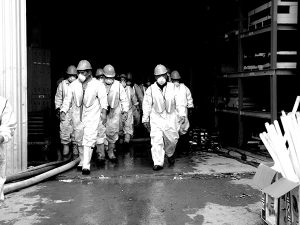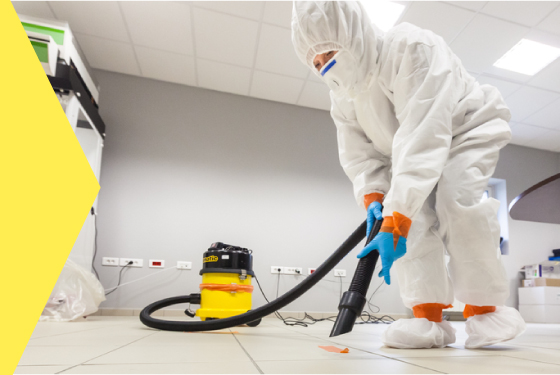Accurate ATP Testing for Effective Cleanliness and Hygiene Tracking
Wiki Article
Specialist Biohazard Cleaning and Purification for Blood, Bodily Fluids, and Hazardous Materials
The prospective health and wellness threats connected with exposure to biohazards emphasize the critical requirement for precise handling and comprehensive clean-up. As we navigate the complex landscape of biohazard cleanup, understanding the nuances of regulations, compliance, and the specialized devices at play ends up being imperative in making sure a thorough and secure purification process.
Health Risks of Biohazard Direct Exposure
Direct exposure to biohazards presents significant health and wellness dangers that can cause serious effects for neighborhoods and individuals alike. Biohazards encompass a variety of biological substances, consisting of blood, bodily fluids, mold and mildew, microorganisms, viruses, and various other possibly transmittable materials. When individuals enter into call with these biohazards, whether with accidents, improper handling, or ecological exposure, they face the threat of contracting severe ailments or diseases.Among the primary health risks associated with biohazard exposure is the transmission of infectious illness. Bloodborne pathogens such as HIV, hepatitis B and C, and numerous microorganisms can be existing in biohazardous materials, posing a direct danger to human health. Breathing in air-borne biohazards like mold and mildew spores or entering into contact with polluted surfaces can likewise result in respiratory concerns, allergies, and various other negative health effects.
In addition, biohazard direct exposure can have lasting health implications, with some conditions materializing years after the first call (Blood Cleanup). For that reason, it is vital to prioritize appropriate biohazard cleaning and purification to reduce these health and wellness dangers and make certain the security of individuals and neighborhoods

Specialized Educating for Biohazard Cleanup
When it comes to taking care of biohazard clean-up efficiently and safely, specialized training plays an essential duty in guaranteeing proper decontamination treatments are complied with. Biohazard clean-up calls for specific understanding and skills to properly minimize dangers connected with bloodborne pathogens, physical fluids, and hazardous products. Professionals educated in biohazard cleanup go through strenuous guideline on how to securely take care of, get rid of, and get rid of biohazardous materials to stop contamination and direct exposure.Specialized training for biohazard cleaning covers a variety of crucial subjects, including proper individual protective devices (PPE) usage, bloodborne pathogen awareness, decontamination methods, and dangerous waste disposal protocols. Individuals learnt biohazard clean-up are outfitted with the required knowledge to evaluate contamination levels, determine potential risks, and implement appropriate clean-up procedures in compliance with regulative standards.
Constant training and education are extremely important in the field of biohazard cleaning to remain upgraded on the current purification modern technologies, security protocols, and guidelines. By spending in specialized training, biohazard clean-up experts can successfully react to emergency situation cleanup situations and protect both public health and wellness and the atmosphere.
Importance of Proper Purification Methods
Using correct purification techniques is crucial in biohazard cleanup to efficiently decrease and get rid of unsafe materials health threats. Efficient purification not just guarantees the elimination of visible traces of blood, bodily liquids, and other biohazards however also targets unseen pathogens that might position significant wellness risks otherwise properly gotten rid of. By adhering to rigorous purification procedures, trained specialists can dramatically lower the risk of direct exposure to dangerous microbes, viruses, and microorganisms that could result in infections or diseases.Correct decontamination strategies involve making use of specialized equipment and disinfectants that are specifically made to counteract biohazards efficiently. Detailed cleansing and disinfection of infected areas are important to prevent the spread of microorganisms and guarantee a secure environment for passengers. Furthermore, the right disposal of biohazardous waste following purification treatments is crucial in stopping contamination of various other surfaces or individuals.

Devices and Devices for Safe Clean-up
When dealing with blood, bodily liquids, or hazardous materials, biohazard cleansing specialists More Bonuses count on specialized gear to pop over here lessen exposure dangers and extensively sanitize the damaged location. Additionally, biohazard cleaning sets containing anti-bacterials, absorptive materials, and biohazard bags are utilized to safely include and dispose of contaminated things.Advanced cleansing tools like hospital-grade anti-bacterials, HEPA-filtered vacuums, and fogging machines are used to sanitize surface areas and remove biohazards efficiently. Specialized equipment such as sharps containers and biohazard waste disposal containers are used to securely handle sharp things and biohazardous waste materials. By utilizing the ideal equipment and tools, biohazard cleaning professionals can make sure a complete cleaning procedure that focuses on safety and minimizes wellness dangers for both workers and occupants of the afflicted area.
Rules and Compliance in Biohazard Cleansing
Proper adherence to laws and compliance criteria is critical in biohazard cleaning to ensure the safety and security of both workers and the setting. Federal government agencies such as OSHA (Occupational Security and Health Administration) and the EPA (Epa) have actually established details standards for biohazard cleanup procedures to decrease health and wellness risks and environmental contamination. These guidelines cover a series of facets including the handling, transportation, and disposal of biohazardous products, along with the needed training and protective tools needed for employees included in the cleaning procedure.Biohazard cleaning companies need to remain current with these policies to ensure that their procedures satisfy the called for safety criteria. Failure to adhere to these laws can cause severe consequences, consisting of penalties, legal activity, and endangering the health of individuals and the setting. By complying with stringent policies and compliance measures, biohazard cleaning firms can properly reduce dangers and guarantee try these out a thorough and secure cleanup procedure for all parties involved.
Conclusion
In verdict, biohazard cleansing and purification need customized training, proper techniques, and adherence to laws. Exposure to blood, physical liquids, and hazardous materials poses substantial health dangers, making it vital to use the right equipment and devices for risk-free clean-up. By following rigorous methods and standards, specialists can successfully mitigate the risks connected with biohazard direct exposure and make certain the security of both themselves and others.
As we browse the elaborate landscape of biohazard cleaning, comprehending the nuances of laws, compliance, and the specialized tools at play becomes critical in ensuring a safe and complete purification process. (Blood Cleanup)
When it comes to handling biohazard cleaning effectively and safely, specialized training plays a basic role in making certain proper decontamination procedures are adhered to.Utilizing correct decontamination methods is crucial in biohazard cleaning to successfully lessen and get rid of unsafe products health and wellness dangers. Additionally, biohazard cleansing packages containing anti-bacterials, absorbent materials, and biohazard bags are utilized to securely get rid of and contain of contaminated items.
Government firms such as OSHA (Occupational Safety and Health Management) and the EPA (Environmental Protection Firm) have actually established particular guidelines for biohazard cleanup treatments to decrease health and wellness threats and environmental contamination.
Report this wiki page